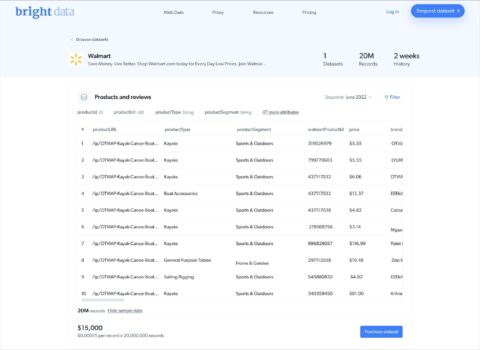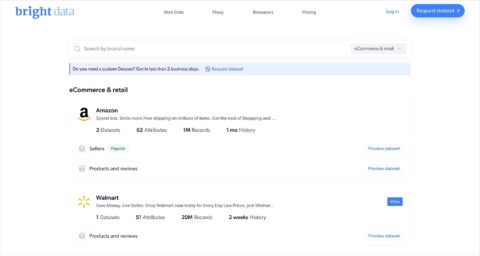This post was sponsored by Bright Data. The opinions expressed in this article are the sponsor’s own.
SEO is a never-ending battle that has everyone vying for the top spot, both literally and figuratively.
The competition between marketing teams across the world has changed the way consumers seek out and buy products and services.
SEO has also changed the overall marketing strategies of small and large businesses alike.
But the search engine tides tend to veer and change direction constantly, especially when it comes to keywords, backlinks, and popularized content.
These changes present constant challenges, even to industry veterans.
Good news is on the horizon.
There is a transformation underway to provide increased clarity to the SEO picture.
That transformation can be accessed through public web data.
What Is Public Web Data?
Public web data is any information that is publicly available online.
This can be easily collected, then used to establish a marketing dataset that informs a successful strategy.
For example, a new company in the field of Customer Relationship Management (CRM) may want to collect web data that informs them on:
- Other companies that are operating in the same field.
- Consumer sentiments, shared on social media channels, about the company or a specific product.
These pieces of information are then used to power algorithms, answer business questions, and compete with other businesses.
As such, public web data can be deemed as a mass collection of public information that shows how general audiences navigate the web and make decisions.
 Screenshot from Bright Data’s Data Collector, June 2022
Screenshot from Bright Data’s Data Collector, June 2022How Does Public Data Help My SEO Strategy?
Public web data helps guide your SEO decision-making by helping to develop strategies based on correct and live information from various sources and regions.
This ensures you aren’t basing critical SEO strategies on outdated or incorrect samples of data.
As a result, you are able to stand out and get ahead of your competitors – something that is critical to success.
For Small Businesses: Public Web Data Provides A Competitive Edge
With savvy tactics, small marketing teams can take on large retail conglomerates like Walmart, Best Buy, and Target.
So, how can smaller teams stand out?
By using public web data to help inform and analyze your SEO strategy, you can:
- Track your search ranking positions in real-time.
- Perform competitor analysis.
- Identify new linking opportunities.
- Track the changes in your search engine ranking relating to your competitors.
- Uncover trends for particular keywords, descriptions, or links.
- Optimize advertising campaigns.
- Uncover duplicate data affecting search positioning.
The real-time, competitive insights that public data brings can help you fully understand what users, or your targeted audience, see when searching for available offerings.
You can use this data to revamp on-page and off-page SEO strategies.
It also provides keyword and backlink intelligence to identify further areas for optimization.
Empowered with this information, you can create and manage more effective content that generates organic traffic from search engines.
What may be even more important is that public web data allows you to see where you rank in search engines all over the world.
Vast amounts of public information are restricted, and companies are often unable to view certain content based on geographical location or device.
Data being available is only half the story. You could try and parse it yourself, but data requires infrastructure to collect, structure, and interpret.
As a result, to monitor SERP rankings worldwide, marketing teams need access to public web data collection services.
These can be utilized to geo-target and automate the collection of data, which ultimately saves you valuable time and resources and helps you make informed and successful decisions surrounding your content output.
How To Find Public Web Data
 Screenshot from Bright Data’s Data Collector, June 2022
Screenshot from Bright Data’s Data Collector, June 2022Bright Data, the world’s #1 platform for data-driven SEO, is a great resource for public web data.
Through public web data for SEO, Bright Data is helping companies rank higher than their competitors, track their SERP positions in real-time, locate untapped backlink opportunities, and create content that resonates with their customers.
As the industry leader, Bright Data is relied on by companies to revolutionize their on-page and off-page SEO strategies, as well as optimize their paid campaigns and reduce cost per click.
Marketing teams globally turn to our platform because it offers:
- The highest quality, most reliable web data.
- The most advanced, fast, and flexible data products and tools.
- The best network and platform uptimes.
- Unlimited scale and customizing possibilities.
- A transparent and enterprise-friendly infrastructure.
- Minimum in-house resources needed by companies.
In addition, utilizing Bright Data’s platform and analysis allows marketing teams to increase the visibility of their apps and ecommerce products for any search platform – regardless of location.
As a result, companies gain valuable insights into new and old competing brands. They’re also enabled to automate, improve, and track keywords.
Make It Easy To Use Public Web Data To Navigate SEO
If you don’t have the infrastructure to properly handle data about your audience and competitors, you might be operating without all the information you need for success.
SEO is not a transparent discipline, so you need every edge you can get.
It can feel like you’re sailing your ship into foggy waters, hoping, but not knowing if you will eventually hit land on the other side.
For marketers to truly be successful in today’s overly saturated market, visibility is key.
You can read as much as you like about SEO best practices, but you won’t know what is and isn’t working about your content until you test and analyze it.
Organic SEO is your key to visibility, content is your key to SEO, and public web data collection services are how you plan, evaluate, and implement the most effective content.
Speak directly with Bright Data’s VP of Brand Marketing & Communications Keren Pakes on LinkedIn and find out how your business can achieve SEO success using public web data.
For more information on how web data collection can help your business, please visit Bright Data.
Image Credits
Featured Image: whiteMocca/Shutterstock
